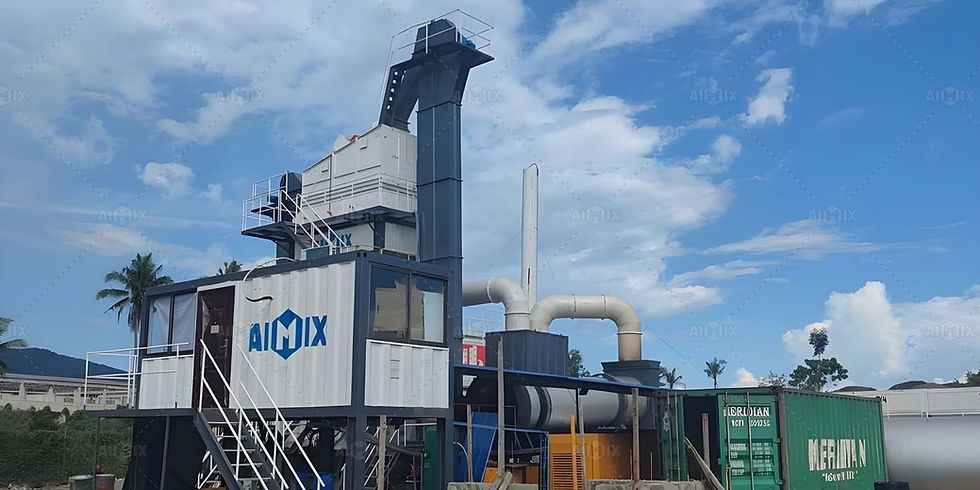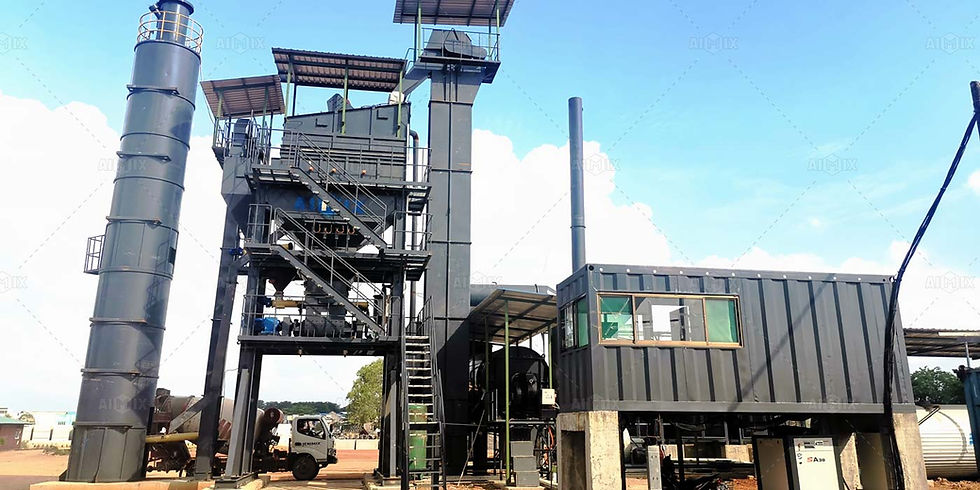How Much Does a 60 TPH Asphalt Plant Save for Projects Under 12 Months?
- wangamy263
- Aug 7, 2025
- 3 min read
Contractors working on short-term infrastructure projects are under constant pressure. Deadlines are tight, material costs fluctuate, and delays often lead to penalties. If you’re building or maintaining roads, highways, or parking lots on a project expected to last less than a year, you may be wondering: Is investing in a 60 TPH asphalt mixing machine really worth it?
The answer may surprise you. Owning your own mobile asphalt plant isn’t just about independence. It’s about control, cost savings, and maximizing ROI in a tight timeline. Let’s break down the numbers and the logic behind why more contractors are choosing to operate their own 60-ton-per-hour asphalt plant.

The Real Cost of Buying Asphalt
If you're currently buying asphalt from a supplier, you're likely paying a premium per ton. In many regions, the delivered price of asphalt mix ranges between $70 to $120 per ton, depending on oil prices, transportation, and supplier margins. For a project requiring 1,000 tons per month, that’s easily $840,000 to $1.44 million over 12 months.
But what if you produced it yourself?
Typical Production Cost with a 60 TPH Asphalt Plant
Operating your own 60 TPH asphalt mixing plant can reduce your mix cost to around $45–$65 per ton, depending on your raw material sources and energy costs. For the same 12,000-ton project, your production cost would be about $540,000 to $780,000.
Estimated savings: Up to $660,000 in just one year.

Other Cost Factors That Add Up
Asphalt savings are just the start. Let’s look at what else you avoid when you operate your own plant.
1. Transportation Delays and Hauling Fees
When relying on a third-party supplier, distance matters. Hauling hot mix over 30–50 km not only adds delivery cost but increases the risk of temperature loss, which can affect paving quality. With your own plant located near the site, hauling costs drop, and paving efficiency improves.
2. Downtime Due to Supply Shortages
Suppliers may prioritize bigger clients or government contracts, leaving smaller or short-term projects with inconsistent delivery. Any delay on your end could lead to idle labor, equipment waiting, and missed milestones. When you run your own plant, you schedule production to match your own pace.
3. Material Waste and Overordering
With a third-party plant, you often need to overorder to prevent shortage. But this leads to waste. Having your own asphalt plant means you produce exactly what you need—no more, no less. That improves budget accuracy and minimizes losses.

Does It Make Sense for Short Projects?
You might assume that owning an asphalt plant only makes sense for long-term or high-volume operations. That’s not always true. If your 8- to 12-month project requires consistent asphalt output—say 40–60 tons per hour for daily paving—a 60 TPH asphalt plant fits the scale perfectly.
Plus, with a mobile unit, you’re not limited to one job. After completing the current project, you can move the plant to another site and continue earning returns on your investment.
Additional Benefits Beyond Cost Savings
Besides the financial gains, owning a 60 TPH asphalt mix plant gives you strategic control. You manage your materials, your schedule, and your paving standards. That reduces your dependency on suppliers and builds your credibility as a contractor who delivers on time and on budget.
Moreover, mobile asphalt plants can be operated with limited space and labor. Some even feature automated control systems, reducing manpower needs and simplifying operation. This is especially useful in remote or island construction areas like in Indonesia, where logistics and labor are both challenges.
What’s the Investment Cost?
A new 60 TPH mobile asphalt mixing plant for sale typically costs between $150,000 to $300,000, depending on configuration, automation, and brand. When you compare this with the potential savings of up to $600,000 in one year alone, the ROI speaks for itself. And if you use the plant for multiple projects, the value multiplies.

Conclusion: Should You Invest in a 60 TPH Asphalt Plant?
If your upcoming project spans 6–12 months and involves regular asphalt paving, owning a 60 TPH plant can offer major financial and operational advantages. You reduce material costs, improve scheduling, and boost your project reliability. Even more importantly, you gain long-term flexibility and competitiveness.
For many contractors in Southeast Asia and beyond, it’s no longer a question of “Can I afford it?” but rather “Can I afford not to?”
We Help You Get Started
At AIMIX, we offer high-quality, mobile 60 TPH asphalt mixing plants ready for delivery. With local support, on-site installation, and technical training, we make it easy for you to take control of your production. Whether your project is in Jakarta, Kalimantan, or Sulawesi, we have engineers and after-sales teams ready to help.
Ready to reduce your asphalt costs? Contact us today and let’s calculate how much you can save in your next 12-month project with your own 60 TPH asphalt plant. Get to know the asphalt plant cost at right!






Comments